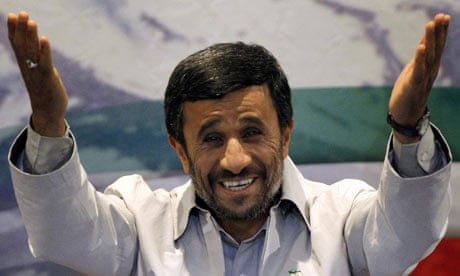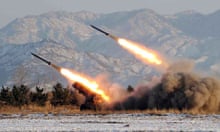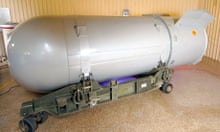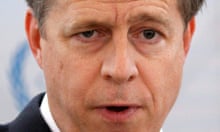There is a growing chorus of approval among US experts for Mahmoud Ahmadinejad's offer of a new uranium deal. So far the enthusiasm has failed to catch on inside the Obama administration or among the rest of the six-nation group that handles nuclear negotiations with Iran. But that could change as the months go by and the Iranian government builds up its stockpile of low enriched and medium (20%) enriched uranium.
Ahmadinejad made this latest offer in the press, first with an interview with the Washington Post in mid-September, and then with the New York Times a week or so later. The essence of the deal, the Iranian president told the Times' Nicholas Kristof, was: "If they give us the 20% enriched uranium this very week, we will cease the domestic enrichment of uranium of up to 20 percent this very week."
The offer is a variant on a series of proposals and counter-proposals on the supply of fuel for the Tehran Research Reactor (TRR), for the production of medical isotopes. The first version involved Iran shipping out of its low enriched uranium (LEU) in return for the 20% enriched uranium required for the TRR. Ahmadinejad seemed to back the deal but it crashed on the reefs of internal Iranian politics. It resurfaced in May 2010 in a proposal brokered by Turkey and Brazil which was rejected by the West when it became clear that Iran intended to continue making 20% uranium at home. This was crucial as mastery of 20% uranium production is said to be 90% of the way to making weapons-grade (90% enriched) uranium in terms of technical difficulty.
In this latest reincarnation of the proposal, Ahmadinejad is saying Iran will stop 20% production. For that reason, the Washington-based Institute for Science and International Security, argued that it would be wise to pursue the deal, on a temporary trial basis:
To test out Ahmadinejad's offer, the United States could suggest that it would arrange the sale of two-year's worth of TRR fuel in exchange for a two-year halt to any production of uranium enriched over five percent. TRR targets for medical isotope production could also be offered for sale to increase interest in the deal.
The idea has been seconded by Ali Faez and Charles Ferguson of the Federation of American Scientists, who suggest supplying Iran with 50 kg of fuel for the TRR unconditionally. They argue it would be seen as a humanitarian people-to-people gesture, helping 850,000 Iranian cancer patients receive treatment, with the strategic benefit of removing "Iran's rationale for refining uranium to more than 3.5 percent".
Faez and Ferguson wave away the risk that Ahmadinejad might not have the regime's full backing for this gambit, as proved to be the case two years ago. They say Ahmadinejad has "repeated the offer often enough, and with confirmation from the foreign minister, that it must have the backing of the Iranian political elite, including Khamenei."
That argument is debatable. Some Ahmadinejad watchers counter that he says lots of things without the Supreme Leader's backing. The bigger problem is that it easier for academics to take these kind of gambles than leaders. Obama is in election mode and all foreign policy decisions are being subjected to a sniff test by his political advisors. Giving Ahmadinejad the benefit of the doubt once more will not sit well in a presidential debate against his eventual Republican challenger.
The rest of the 5+1 group (the P5 and Germany) have had little to say about the offer, holding fire until there is internal cohesion among the six, but if Iran continues to increase 20% U production at the present rate, and Israel shows signs of contemplating military action once more, desperation may take the upper hand and the Obama administration will be under increasingly heavy international pressure to take the risk.





Comments (…)
Sign in or create your Guardian account to join the discussion